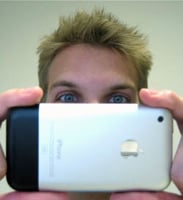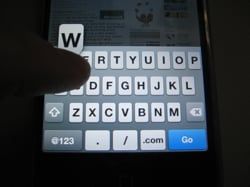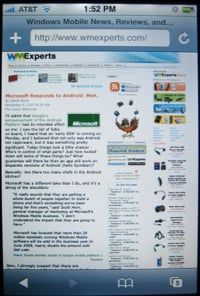Smartphone Round Robin: Initial Impressions on the iPhone

Readers of WMExperts and of our iPhone site, Phone different know that the iPhone isn't exactly a mystery to yours truly. I am sub/co-host to the Phone different podcast and have chimed in over at Phone different with the occasional review from time to time. I've also put up several smackdown-y articles comparing the iPhone to Windows Mobile in various ways here at WMExperts:
- SDK? We Got Your SDK Right Here, no longer really relevant since Apple announced one is coming
- The iPhone is not a Smartphone, since recanted, sorta
- HTC Touch vs iPhone Part 1
- HTC Touch vs. iPhone Part 2, Video Smackdown, this is the big one, a long feature by feature vid
- iPhone vs. Windows Mobile, Email Smackdown, the 'tap count' article
Yet I've never made the iPhone my only device, dependent on it for all things from entertainment to productivity. I'm three days into doing just that for the Smartphone Round Robin and it's going, well, pretty darn well. Read on for my initial thoughts, feelings, gripes, jabs, and raves on the iPhone.
Hardware
The iPhone is quite possibly the most impressive piece of mobile hardware I've even laid my hands on. Apple's decision to exclude a physical keyboard and a removable battery -- while not something I am particularly happy about -- means that they were able to make the iPhone a single, solid piece. It's “singular” in a way that no other smartphone is. With other devices, you can pretty much identify “parts” and “pieces” that make up the phone, but the iPhone is an “object” in a way that's difficult to describe.
The effect isn't too difficult to describe, though, it makes the iPhone a very appealing device. I personally find it a touch taller than I'd like, but I'm also very impressed by how thin it is - I don't know that I've ever owned a touchscreen device this thin.
In addition to making the iPhone “singular” and thin, Apple has also added oft-discussed hardware innovations to the device. The proximity sensor, which turns off the screen when it's held up to your face, works flawlessly. The accelerometer, which tells the iPhone when it's time to rotate the screen, is a little buggier for me, but I have no complaints about it. It doesn't seem to work properly when the iPhone is “flat” and I occasionally find myself twisting the iPhone quickly to get the accelerometer to “take.”
Last, but not least, the screen is gorgeous. The pixel density of the 320x480 screen is superb and I love that it's scratch-resistant glass. The multi-touch touchscreen sensor is also very responsive and although I don't find the two-finger stuff blows me away, it is pretty fun to use. The only downside is that there are a few operations that pretty much require two hands (specifically tight-zooming in the browser and photos).
The Soft-Keyboard

I'm doing alright with the soft-keyboard on the iPhone. Apple's spell-check, “trust the magic” word guessing scheme is actually pretty good. However, when I really get moving on the keyboard it often fails me, sometimes spectacularly. The real hassle with the soft keyboard is that you'll always need to look at the keys a bit more than you do with a physical keyboard. I don't think I (or anybody) will ever develop muscle memory with the iPhone like we do with physical buttons. I could be wrong, but I doubt it.
Get the Windows Central Newsletter
All the latest news, reviews, and guides for Windows and Xbox diehards.
Muscle memory aside, what happens when I'm looking at the keys is that I'll miss mistakes that were made earlier in the sentence, paragraph, email. The iPhone's magnifying-glass text positioning feature is alright (kudos for finding a non-stylus solution), but it's difficult to use sometimes (especially when the text is at the top of the screen). Finally, I get tired of holding down the delete button to erase entire stretches of gibberish that I missed because I was staring at the soft-keyboard instead of at what I was typing out.
In short, this writer prefers physical keyboards and seriously doubts any length of time with the iPhone will change his mind. Soft keyboard, however, are good enough 90% of the time, especially on the iPhone.
Staying on the subject of soft-keyboards: The iPhone's soft-keyboard is slightly better than most of the solutions I've used on the HTC Touch, despite what I've mentioned earlier in my HTC Touch vs. iPhone video. I still think that Windows Mobile-based soft keyboards can be better than this iPhone keyboard, but the issue right now is hardware. The iPhone has a larger screen and a more responsive touchscreen, so it's able to drive a soft-keyboard more easily.
Windows Mobile-wise, I do actually think solutions like SPB's Full screen keyboard or TouchPal are ultimately better than the iPhone's soft keyboard, but the hardware and some little implementation bugs are still present. As more touchscreen-only Windows Mobile devices are released, I think that WM soft keyboards will surpass the iPhone's. In fact, I suspect that the soft-keyboard on the Sprint Touch (see our hands-on) is likely better, but I haven't used it for more than an hour or so, so I can't say that with authority yet.
Setup & Sync
No complaints here, but I'm also syncing the iPhone to a Mac, so if I did have complaints they'd be pretty serious. The only real hassle I've experienced that that most of my life has been on an Exchange Active Sync Server hosted by 1and1.com. I've been very happy with their service but still haven't managed to get Apple's Address Book to talk to it properly.
Settings and general setup on the iPhone is equally simple. I do find it slightly unsettling that every setting is found under settings and not within the app itself - it makes me feel like there are tweakability options I'm missing out on somehow. But the feeling that I'm missing out on tweaking a device is something I've learned to get used to with the iPhone (at least until I jailbroke it, more on that below).
I do wish I could use custom ringtones for all alerts and not just the phone ringing. I'm particular about alert sounds (especially SMS). It drives me six kinds of crazy that I can't find a suitable SMS tone.
I'll also say here, in the setup section, that I highly recommend jailbreaking your iPhone to install 3rd party apps. It makes it a real smartphone and installer.app is sweet. By far the best solution for installing and managing 3rd party apps I've ever used, mobile or desktop.
Browser

Mobile Safari is the best browser on a mobile device I've ever used. Full Stop.
The thing that impresses me most about Safari is the thing that seems to get the least attention: their “tap-to-zoom” feature is really smart. When you tap on an area on a webpage, Safari takes a guess at the table cell or “div” and expands that to fill the screen. 9 times out of 10, it's exactly right. There have been a few problem pages where I can't get Safari to show me what I want, but it's a tiny fraction of the hassles I experience on a daily basis with literally every other mobile browser out there. Ditto clicking some links - getting Safari to zoom in enough or in the right spot for me to tap the link I want is sometimes a hassle - but still less of a hassle than 5-waying through an entire page.
If the next version of Windows Mobile doesn't have a browser that's at least half as good as this, you will find me camped outside their HQ in Redmond, eating beans from a can and holding up a “FIX Pocket IE NOW” sign.
Media
The iPod functionality on the iPhone is just grand. Version 1.1.1 fixed my hassles with the iPod (podcasts were appearing in coverflow and getting to the “stop” stuff took way too many taps). Videos are stellar - crisp and painless. iTunes WiFi is fun, though in a perfect I would be able to filter it so I was only seeing the non-DRM'ed files.
Microsoft - steal these interfaces and add them to Windows Mobile. But hang on to physical buttons for Play/Pause/Next/etc, I like those better than the touchscreen for music. Using the iPhone in the car is dangerous all the way around, it's even dangerous for music. I keep having to look down, flip the iPhone so the buttons are where I expect, etc.
Business & Productivity
We come to it: the turning point of this mini review, where my praise turns to condemnation and the joys of the iPhone are outweighed by its mystifying omissions.
I've already explained, at length, why email on the iPhone is inferior to email on Windows Mobile, but it bears repeating: email on the iPhone is bad. Deleting, moving, saving, it's all a hassle. It's missing basic functionality like BCC. If I receive an email with a photo that's attached I can't do a single thing with it except forward it on.
That last bit points to even more missing basic functionality, but it's not entirely the fault of the mail client. Although the iPhone will allows you to view attachments (including office attachments), there is no way for the user to get access to anything like a file system (without hacks). So the iPhone has no concept of “saving files.” A glass-half-full mentality would view this as a refreshingly new take on mobile computing that breaks the desktop paradigm on smartphones. A rational mentality would view this as bollocks - my Treo 180g could handle this fine.
The response here is that I'm being unfair because the iPhone is too new, I should wait until February when the SDK is out and Apple's filled out the Operating System a bit more. Fair enough. Until then, the iPhone can't cut it as my only mobile email device.
I will say that the iPhone does a great job of displaying individual emails, be they html or plain text.
PIM
The iPhone does a decent job with calendaring and contacts (even though I miss autofilter searching on the contacts app). What is doesn't do it ToDo (one assumes that's coming soon) or syncing notes. I downloaded a 3rd party app for ToDo, but without syncing it's not very useful to me. Ditto other things I depend on my smartphones for, like encrypted password databases - there are now apps if you've hacked your iPhone, but they're not full featured enough yet.
Documents
I'll admit I'm not a heavy office mobile user, but when I need it I need it. Viewing is nice; Editing, Creating, and Saving are better.
Is it a Smartphone?
Mike at Phone different and I have a long-running argument about whether or not the iPhone “qualifies” as a smartphone. I have suggested that, until the recent hacks have turned it into a viable platform for 3rd party apps, it was not. Mike has suggested that I'm committing a logical fallacy with this. I have suggested a prime location to stick his claim that I was committing a logical fallacy. It has actually been fun.
The difficulty, here, is twofold. One is defining what a smartphone is in the first place, the other is trying to do the first with the iPhone in mind. The inevitable result is bars get lowered by one side and raised by the other. Add in the fact that so-called “featurephones” are getting “features” that were traditionally in the domain on smartphones and you have yourself a royal mess on your hands. Wikipedia's entry is no use either, studiously avoiding defining anything. I'm actually tempted to put a bounty out for “a decent, stable, and testable definition of smartphone” so we can really and truly pin the sucker down and then use that definition to separate the wheat from the chaff.
So let's just go on gut for now.
Speaking strictly about unhacked iPhones: I'll just say that the iPhone feels like it's not quite a smartphone, that it's still just a super-charged featurephone that happens to have a gigantic screen and a (soft)QWERTY keyboard. It's some combination of a lack of a user-accessible file system, a lack of 3rd party apps, a lack of tweakability. The iPhone seems like it comes from a world of iPods rather than a world of work.
Now - add in the fact that the iPhone is now “hackable,” that an SDK is coming and people will be able to develop 3rd party apps for it and a lot of those hassles disappear. The OS the iPhone runs on is fully UNIX (or fully OS X, though I'm not enough of a software engineer to be able to say just what makes OS X ...OS X), so I sincerely doubt that there will be a smartphone feature or need that won't be fulfilled by some app.
Is the iPhone a smartphone? Before it was hacked and 3rd party apps became available, my answer was “not sure, maybe, not really, could be, but not quite.” Now it's “I guess so, but I'm much more comfortable saying that if it's hacked.” In 6 months the answer will be “Obviously.”
Conclusion
I'll keep using the iPhone for the rest of the week and there's a strong chance it has found a permanent place in my gear bag (for movies) unless someone wants to trade for a 16gb iPod Touch. As my “main brain,” though, I'm not optimistic I can recommend it to a large swath of my readership. Which is to say: it's superb for people who don't need a smartphone for productivity, it's probably not going to cut it for those who do.
I could still be wrong, I could potentially make the iPhone do what I need it to do and I will keep trying for another 4 days. Keep an eye out for how I did on Friday. Windows Mobile users - Mike at Phone different has the Tilt, be sure to go help him out. Comment there or here for more entries in the Round Robin Contest!
Home to the most invested and passionate Microsoft fans, Windows Central is the next generation destination for news, reviews, advice and buying recommendations on the Windows, PC and Xbox ecosystems, following all products, apps, software, AI advancements, and accessories. We've been around for more than decade, and we take our jobs seriously. Windows Central writers and editors value accuracy and editorial independence in everything we do, never receiving compensation for coverage and never pulling punches.
